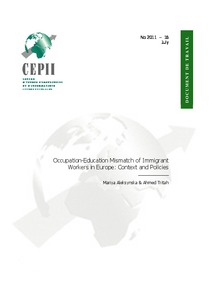Occupation-education mismatch of immigrant workers in Europe: context and policies
"This paper analyses occupational matching of immigrants from over seventy countries of origin to 22 European countries. Using European Social Survey for the years 2002-2009 and the multinomial logit framework, we show that, relative to the native born, immigrants are more likely to be both und...
| Main Authors: | , |
|---|---|
| Institution: | ETUI-European Trade Union Institute |
| Format: | TEXT |
| Language: | English |
| Published: |
Paris
2011
CEPII |
| Subjects: | |
| Online Access: | https://www.labourline.org/KENTIKA-19177393124919955759-occupation-education-mismatch-.htm |
| Summary: | "This paper analyses occupational matching of immigrants from over seventy countries of origin to 22 European countries. Using European Social Survey for the years 2002-2009 and the multinomial logit framework, we show that, relative to the native born, immigrants are more likely to be both under- and overeducated for the jobs that they perform. This mismatch is due to individual-specific factors, such as labor market experience and its transferability. Immigrants’ outcomes converge to those of the native born with the years of labor market experience. The mismatch is also due to immigrants’ selection and sorting across countries. Notably, we show that origin countries’ degree of income inequality and the quality of human capital, by affecting selection, mostly matter for undereducation of immigrants. Overeducation is determined to a greater extent by destination-country economic conditions and labor market institutions. Immigrant-specific policies in destination countries, such as those improving eligibility and fighting discrimination, also positively affect overall matching, while policies promoting integration decrease undereducation." |
|---|---|
| Physical Description: | 41 p. Digital |

